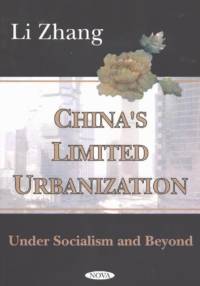Om China's Limited Urbanization
Under-urbanisation, defined as the achievement of a high industrial growth without a parallel growth of urban population, is one of the profound features of socialist development. Under-urbanisation in China, in effect, represents a seriously distorted relationship between urbanisation process and economic development as conventionally understood on the basis of well-documented Western experience. In an attempt to theorise the Chinese urbanisation experience, scholars often treat it simply as a by-product of restricted migration policies driven by the overall strategy of industrialisation. In contrast to the thrust of the extant influential literature on urbanisation in the context of socialist economies, where industrialisation strategies alone are taken as fundamental in explaining what we find evolving through time, this book has focused, rather, on systemic characteristics that have not received the thorough treatment already given the strategies of industrialisation. From a perspective of political economy to analyse the impacts of economic system requirements on urbanisation, this study argues that the root cause of Chinese under-urbanisation is systemic, in which state controls and the state-biased nature play a decisive role.
Visa mer

